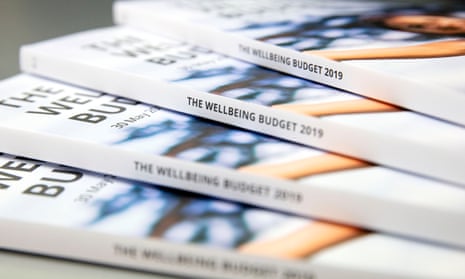After more than a year of curiosity and speculation, New Zealand’s Labour coalition government has unveiled its “world-first” wellbeing budget, to widespread praise from social agencies charged with looking after the country’s most vulnerable people.
The finance minister, Grant Robertson, unveiled billions for mental health services and child poverty as well as record investment in measures to tackle family violence.
“Success is making New Zealand both a great place to make a living, and a great place to make a life,” Robertson told parliament.
He said many New Zealanders were not benefiting from a growing economy in their daily lives, and this year’s budget had been designed to address the growing disparity between the haves and have-nots. According to predictions by the International Monetary Fund, the economy is expected to grow at about 2.5 % in 2019 and 2.9% in 2020.
Although comparable countries such as the UK have begun to measure the national rate of wellbeing, New Zealand is the first western country to design its entire budget based on wellbeing priorities and instruct its ministries to design policies to improve wellbeing.
As expected, mental health received the biggest funding and investment boost on record, receiving NZ$1.9bn (£980m). Half a billion was earmarked for the “missing middle” particularly – New Zealanders suffering from mild to moderate anxiety and depressive disorders that did not require hospitalisation but significantly affected their quality of life.
Close to half a billion would be spent on new frontline mental health workers stationed in doctor’s surgeries and Indigenous clinics, with the government aiming to help 325,000 people with “mild to moderate” mental health and addiction needs by 2023-24.
Mental Health experts described the government’s focus on mental health as “ambitious”, and expressed excitement and relief that improving the mental health of New Zealanders across the board was finally becoming a priority, as year on year the New Zealand suicide rate continued to climb.
“Mental health is no longer on the periphery of our health system. It is front and centre of all of our wellbeing,” said Robertson.
Prime minister Jacinda Ardern said for her, the issue of mental health was “deeply personal”. “Almost all of us have lost friends or family members. Ensuring that New Zealanders can now just show up to their GP or health centre and get expert mental health support is a critical first step.”
#Budget2019 tackles key social determinants of #mentalhealth such as housing, child poverty, family and sexual violence - this is all part of prevention and creating a more just society.
— Mental Health Fdn (@mentalhealthnz) May 30, 2019
Measures to combat family violence also received a record investment of $320m, in a bid to tackle the country’s entrenched family and sexual violence statistics, which see the police respond to a domestic violence incident every four minutes.
Ang Jury, director of Women’s Refuge said the increased spending was urgently needed and her sector was “over the moon”, despite Women’s Refuge itself not receiving a boost.
New Zealand is among the worst for family and sexual violence in the OECD.
“We are really over the moon about the overall package, it’s great. By god yes this is the most spending by far, there’s not even anything to compare it to. The foundation they’re setting up to truly tackle this is absolutely fantastic.”
Child wellbeing, long a passionate focus for Ardern, who is in charge of the portfolio, will receive more than $1bn. According to Unicef 27% of New Zealand children live in income poverty, defined as going without necessities such as nutritious food, healthcare, and a warm, dry home.
Really good to see the major increase in funding for mental health services in NZ Budget. Very needed in Ōtautahi Christchurch where many people are still hurting after the terror attack. #WellBeing #Kiakaha #Budget2019 @UCNZ https://t.co/gDwgAYReOT
— Professor Anne-Marie Brady (@Anne_MarieBrady) May 30, 2019
“As the minister of child poverty, there is no ignoring the stress and strain that material deprivation causes our families,” Ardern said.
“When our children do better, we all do better.”
Robertson said: “For me, wellbeing means people living lives of purpose, balance and meaning to them, and having the capabilities to do so.
“This gap between rhetoric and reality, between haves and have-nots, between the elites and the people, has been exploited by populists around the globe.”
The opposition National party leader, Simon Bridges, slammed the budget as an overhyped “disappointment” that was failing everyday New Zealanders.
“This is not a wellbeing budget. Most New Zealanders will be left asking themselves what’s in it for them. Families want more money in their weekly budgets for food, petrol and rent. Instead, their taxes are going towards rail, the defence force and trees,” he said.
“This budget is style over substance. It might have a glossy cover with nice pictures, but it’s hollow inside. This botched budget is not transformational.”
